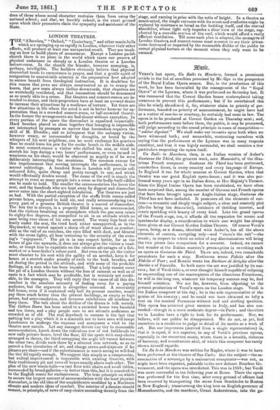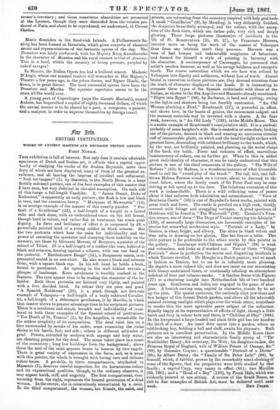31insir.
VEB.DI'S last opera, Us Ballo is Masche-a, formed a prominent article in the list of novelties promised by Mr. Gye in the prospectus of the Royal Italian Opera season. But, in the production of this work, he has been forestalled by the management of the " Royal Opera" at the Lyceum, where it was performed on Saturday last. It was rumoured that the Covent Garden lessee contemplated taking measures to prevent this performance ; but if he entertained this idea lie wisely abandoned it, for, whatever claim to priority of per- formance, founded on priority of announcement, he might have had as a matter of consilas or courtesy, he certainly had none in law. The opera is to be produced at Covent Garden on Thursday next.; and, both performances once before them, the public, it may be presumed, will judge according to the sound principle in cases of competition- " addict digniori." We shall make our remarks upon both when we have witnessed both ; and meanwhile, contenting ourselves with saying that the perfurmance at the Lyceum was in many respects excellent, and that it was highly successful, we shall mention a few particulars respecting the opera itself.
Un Balk. in Masehera, then, is an Italian version of Auber's Gustavus the Third, the greatest work, save Masaniello, of the illus- trious French composer. Gustavus the Third has been performed, numberless times, in every country and every language of Europe. In England it ma for whole seasons at Covent Garden, when that theatre was our great English opera-house ; and it was also per- formed many years ago in an Italian dress, at Her Majesty's Theatre. Since the Royal Italian Opera has been established, we have often been surprised that, among the number of German and French operas that have been brought. upon our Anglo-ltalian stage, Gustavus the Third has not been included. It possesses all the elements of suc- cess—a romantic and deeply tragic subject, a clear and masterly plot (Scribe being the dramatist), incidents of thrilling interest, and music sparkling with beauty of every kind. Like the grand operas of the French stage, too, it affords all the requisites for scenic and 'spectacular display, a consideration to which due weight has always been given at our Covent Garden Italian Theatre. Of course Verdi's opera, being, as a drama, identical with Auber's, has all the above elements of success, excepting only—and " there's the rub"—the music; in respect to which no critic of any discrimination will bring the two pieces into comparison for a moment. Indeed, we cannot but wonder at the Italian maestro's presumption in rewriting such an opera as Gustavus the Third. There are, indeed, two remarkable precedents for such a step. Beethoven wrote Fidelio after the Fiddle of Peer; and Rossini wrote the Barbiere di Siviglia after the Barbie,e of l'aesiello. In both cases the act was justified by its suc- cess; but if Verdi thinks, or ever thought himself capable of eclipsing or superseding one of the masterpieces of the illustrious Frenchman, he will in the long run, whatever his temporary success may be, find himself mistaken. We are far, however, front objecting to the present production of Verdi's opera on the London stage. Verdi is the Italian composer of the day; he is the sole representative of the genius of his country ; and he could not have obtained so lofty a seat on the musical Parnassus without real and sterling qualities. This opera has achieved great success in Italy, and has also suc- ceeded—though in a more moderate degree—in Paris ; and therefore we in London have a right to look for its performance. Nor, we believe, will our public be disappointed. We do not, as yet, feel ourselves in a condition to judge in detail of its merits as a work of art. But our impression (derived from a single representation) is, that it is equal, if not superior, to any of Verdi's previous operas, especially iu the concerted music, where there is a breadth, richness of harmony, and constructive skill, of which this composer has rarely shown himself capable.
Un Ba lo in Navarra was written for Naples, where it was to have been performed at the theatre of San Carlo. But the subject—the as- sassination of a sovereign by a malcontent conspirator—was not, as might have been expected, palatable to the now defunct Bourbon Go-
vernment, and the opera was interdicted. This was iu 1858 ; but Verdi was more successful in the following year at Rome. There the opera
was performed for the first time, after every ground of offence had been removed by transporting the scene from Stockholm to Boston in New England ; transforming the king into an English governor of Massachusetts, and the murderer, Count Aukerstroem, into the go-
veruor's, secretary ; and these monstrous absurdities are preserved at the Lyceum, though they were discarded from the version pra- dueed at Paris, and about to be reproduced, we understand, at Covent Garden.































 Previous page
Previous page